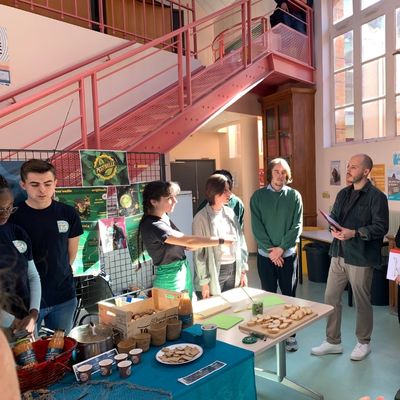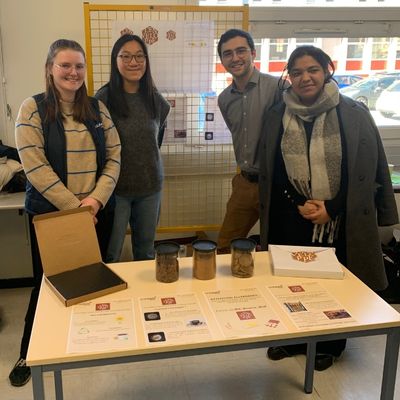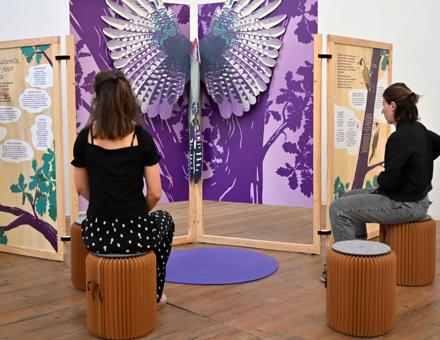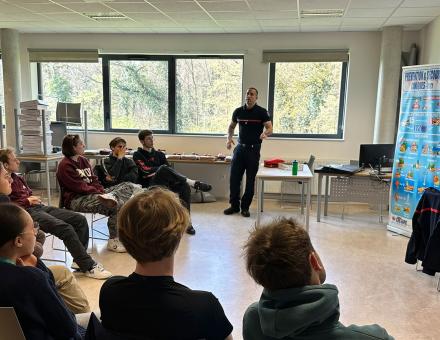Creativity and expertise were the order of the day for the 20 students in the Biosourcing, Biotechnologies and Environment course who took part in the INNOV'ALIM SCHOOL 2025 competition, the final stages of which took place on Thursday March 20 at the IUT in Evreux.
This not-to-be-missed event in Normandy's agri-food sector challenges students to come up with an innovative food product on the theme: “Bringing a neglected product and/or co-product back into fashion”, while promoting culinary traditions and sustainability.
Two of the five teams presented by UniLaSalle Rouen were among the eight finalists (out of a total of 26 participating teams):
- Team Pestouille, who worked on a nettle pesto ;
- Team Enveloppe, which chose to use cocoa bean skins to produce cookies, a project the students were able to carry out in collaboration with Alain Ducasse's Manufacture de Chocolat.
Both projects won over the jury, made up of food industry professionals and partners.
Pest'Ouille, a nettle pesto

Briefly present your product to us
"What is Pest'Ouille? It's a nettle pesto! It is therefore made from nettles, a plant that is nowadays neglected, despite having many agronomic, nutritional and environmental virtues. But Pest'Ouille also contains flaxseed, sunflower oil, garlic, salt, cider vinegar and goat cheese. Pest'Ouille can be eaten with a dish like pasta or as an appetizer dip, an ideal spread to delight your guests!"
Why work on this product?
"With the idea of changing production and consumption methods to make them more environmentally friendly, we wanted to make the most of a plant classified as a weed. Nettle came to us rather quickly. We looked into it and realized that it was a plant with a lot of advantages: it grows everywhere, it doesn't need chemical inputs to grow, it has very interesting nutritional values, such as a high protein content, many vitamins & minerals, etc., and its stem contains fibers that can be used to create biomaterials.
We were therefore able to create a product that was produced in a way that was healthy for the environment and for health, while using the whole plant - the leaves for Pest'Ouille, the stems for biomaterial packaging.
Why pesto? It's a sauce used by many people, an easy way to bring a neglected product back into fashion."
What have you learned from this experience?
"This experience taught us to work on a long-term project, to work in a group, to manage stress, but also to discover all the issues we face when we want to create a new product. We looked at all the aspects, from creating the recipe to the market our creation fits into. We tried to sell our product, a new challenge for most of the group! It was a very good experience and we are very proud to have reached the final."
L'Enveloppe, a biscuit made from the skin of roasted cocoa beans

Briefly present your product to us
"L'Enveloppe is not just a biscuit. It is part of a sustainable approach, both in its design and in its packaging. We sought to create a product that is healthy, tasty and that enhances the natural aroma of cocoa, appreciated by everyone (or almost!). Its originality and its commitment to the promotion of by-products won over the judges and the various test phases.
Thanks to our partnership with Manufactures Alain Ducasse, we were able to bring this project to fruition and present it at the Innov'Alim final."
Why work on this product?
"During our search for a topic for the competition, Manufactures Alain Ducasse, represented in our school by Céline Dubourdieu (production director), proposed this partnership to us, focusing on the valorization of a co-product. We were immediately interested in this topic.
The revalorization of co-products, particularly in the chocolate sector, is a crucial issue today. With the decrease in cocoa production and the constant increase in the price of this raw material, it is becoming essential to think about alternative and sustainable solutions to optimize its use."
What did you learn from this experience?
"This experience was a valuable opportunity to develop our project management skills. Unlike short projects, this one is long-term, forcing us to adapt to the unexpected, to structure our work and to produce concrete results.
We also gained real autonomy by conducting our own experiments and tests, while strengthening our communication and presentation skills.
In short, beyond the competition, Innov'Alim was a unique opportunity to train for our future careers, to meet agri-food professionals and to explore the challenges related to innovation and sustainability in this sector."
The result of several months of work for the students
For the participating students, the INNOV'ALIM competition is a long-term project that follows them throughout the year.
“In the first semester, the teams concentrated on their product,” explains Richard Gattin, head of the Biosourcing, Biotechnology and Environment course. "Each team has to produce a technical report, which is marked and submitted to the competition organizer, AREA Normandie. The second semester is devoted to communication about the product and food they have developed. This is also the time when they prepare their oral presentation on March 20, a decisive moment for qualifying for the final."
To prepare them as well as possible for this project, the students benefited from courses in creativity, project management, research strategy and communication.
A competition that supports the Normandy agri-food industry
With more than 285 members, AREA Normandie (the regional association of Normandy agri-food companies) brings together players in the food industry around common issues: employment, training, attractiveness, CSR, innovation, etc.
By organizing this competition, a variation of the Agri-Food Trophies reserved for students of agri-food courses, AREA Normandie thus brings the economic world closer to that of higher education in Normandy.






